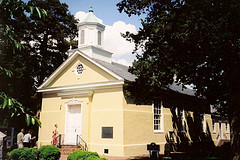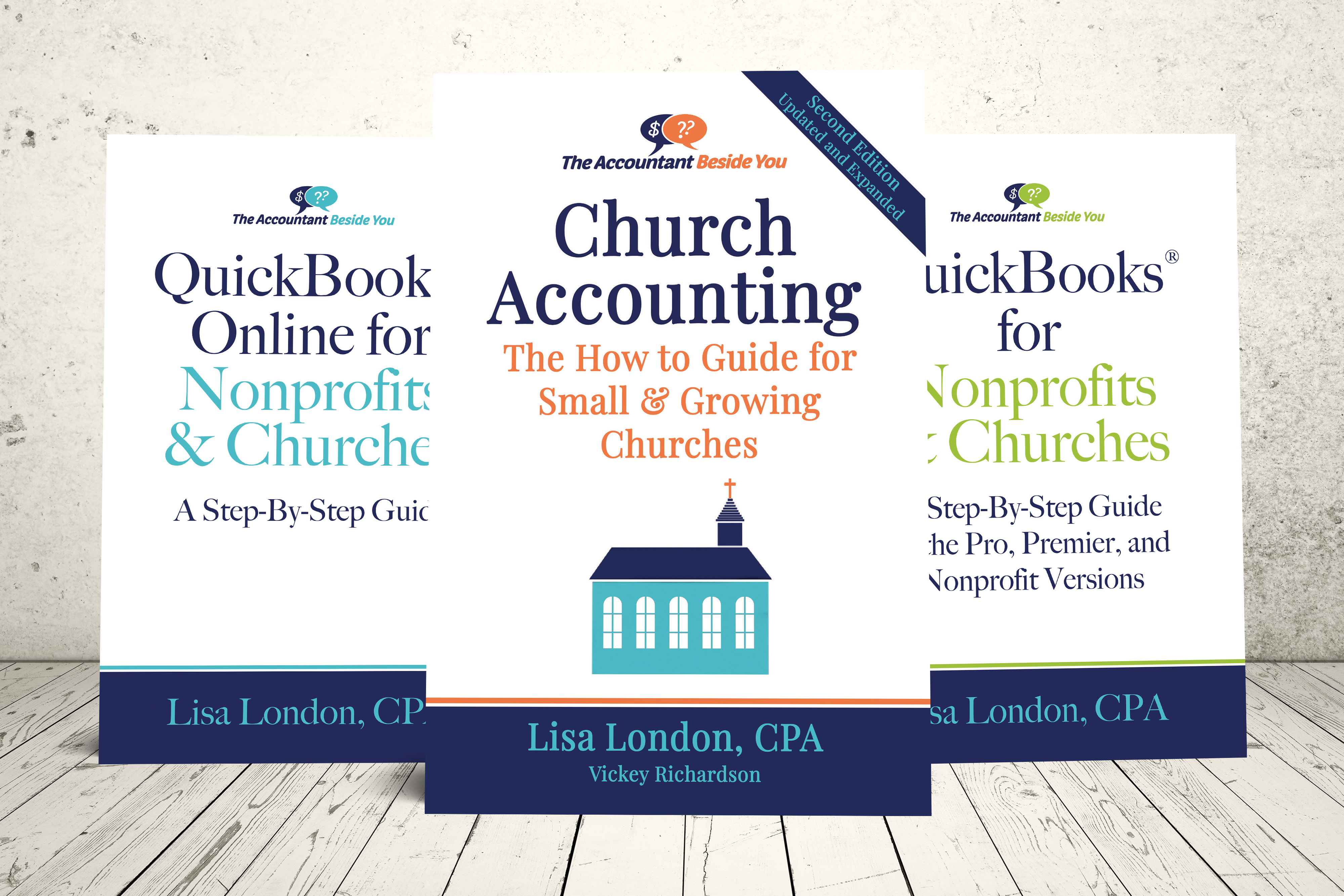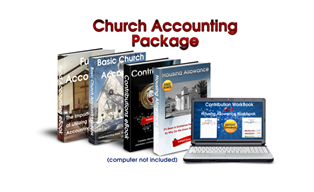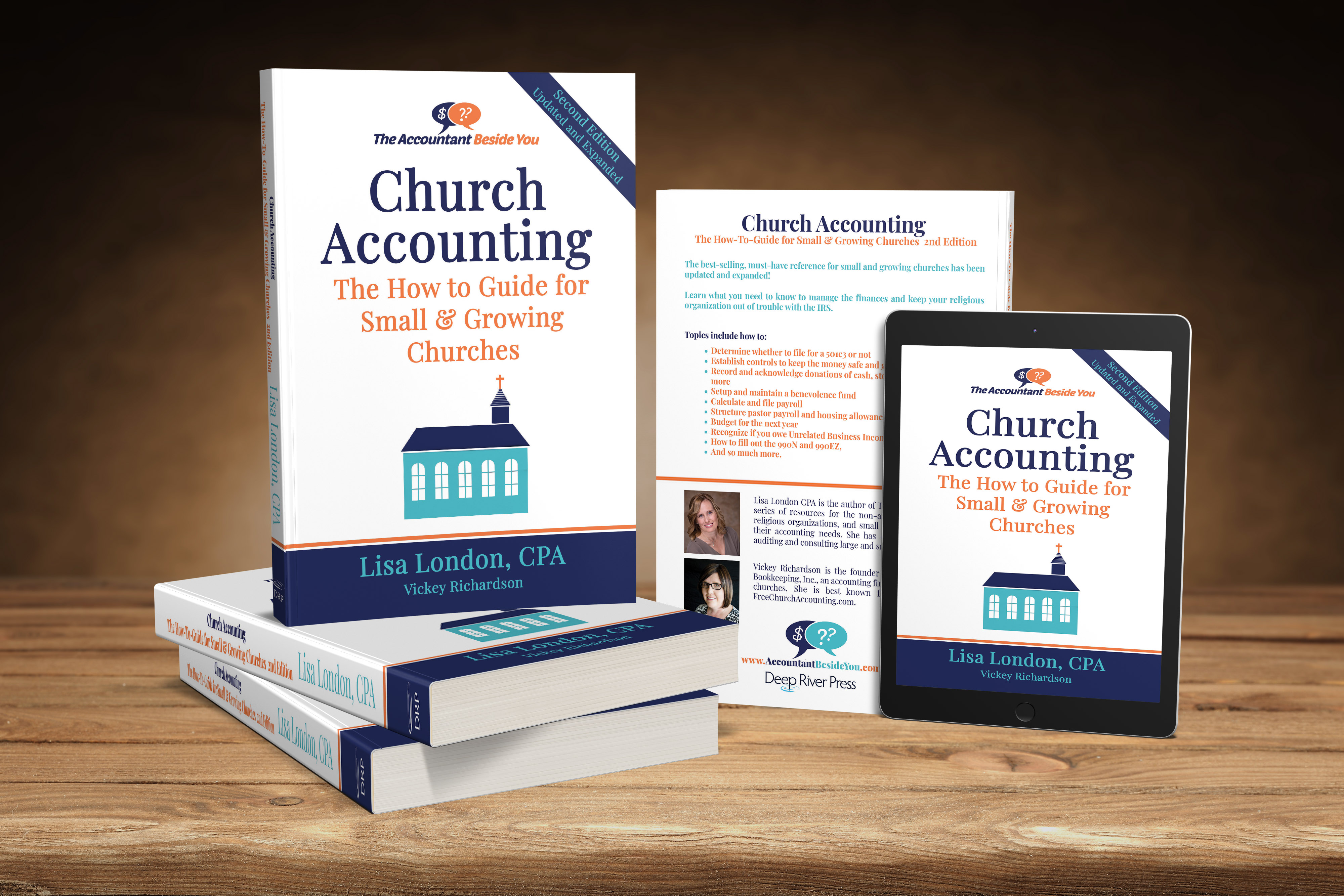Internal Controls
Are You Keeping Your Organization Safe?
Internal controls are measures utilized by an organization to safeguard assets from waste, fraud, and inefficient use.
Internal cash controls can be a sensitive issue in churches or nonprofits, especially those that relies on volunteers.
Your organization is built on the concepts of honesty, truthfulness, and mutual trust.
However, speaking as a church volunteer myself, most of us realize that internal controls not only protect the organization’s interests, but can also protect the staff members from false allegations.
Most volunteers and church staff members are good honest people and do not mind controls put into place that protect the organization's assets from theft or loss. See this article on Guarding against Church Embezzlement.
Church Accounting Package
A set of 4 ebooks that covers the following topics...
- Fund Accounting Examples and Explanations
- Setting up a fund accounting system
- Donation management
- Minister compensation and taxes
- Internal controls and staff reimbursements
- Much more - Click here for details

Setting up a System of Internal Controls:
Because each church or nonprofit is unique and operates with its own set of unique circumstances, the financial leaders of each organization must design the system of internal controls to meet their specific needs.
Accountants have the knowledge and expertise to help churches and nonprofits implement these needed procedures.
Hopefully you have one in your organization you can trust. If not, you might want to consider hiring one, who is familiar with churches and/or nonprofits, if you are not comfortable with setting up a policy yourselves.
Internal Control Procedures:

In my opinion the most important measure you can put in place is...separation of duties.
There are three basic types of financial activities that are performed in a church or nonprofit:
- authorization of transactions,
- recording of transactions,
- custody of assets.
A lot of small churches and nonprofits have only one person handling all of their financial affairs.
However, you should try if at all possible, to use enough individuals to achieve proper segregation of these activities...for that person's sake as well as the organization.
See some suggested financial responsibilities for your staff.
This How To Book for Churches is packed full of tips for:
- setting up internal controls,
- cash out-controls for debit/credit cards
- setting up an effective fund accounting system,
- handling and tracking contributions,
- setting up compensations for a minister,
- handling a payroll for a church
- preparing nonprofit financial statements,
- and much more.
For a church:
- Offerings should always be counted by at least two non-related individuals (regardless of how big or small you are).
- Counters and ushers should be rotated periodically.
- Counters should have a safe room to count the offerings with no interruptions.
- Counters should fill out a count summary and sign in ink to verify their accounting.
Then another individual is responsible for recording the contributions to each family’s contribution record and to the general ledger and then depositing the funds in the bank as soon as possible. The money should be kept in a safe until deposit.
Thirdly, another unrelated individual who has not had any access to the funds should perform a bank reconciliation each month.
Different groups having different checking accounts in a church can cause problems too. See this article on accounting internal controls and church groups.
For a nonprofit:
There are a wide range of internal controls. For example, you might have authorization lists about who can access which areas of the building, types of information, etc.
Your business's mail should be opened by one person who logs in each check that is received. This person will be someone other than the person who deposits the checks to the bank.
Disbursements of large amounts, for example, over $500, may require a secondary signature, for example, from the board treasurer.
For both churches and nonprofits:
Verify that all checks have been properly signed and that the bank balance reconciles to the bookkeeping records.
You should also verify that the beginning balance equals the ending balance of the previous month both in the checking account and the general ledger.
Another internal cash control procedure is...Establishing clear guidelines for the handling of your organization's funds.
If at all possible...a written financial procedures manual will help establish these guidelines.
A very important internal control procedure is...conducting an annual financial audit.
The audit may be external (performed by an outside Certified Public Accountant) and/or internal (reviewed by business people in the organization who understand financial management).
And last but not least...Require two signatures on all checks.
Those writing and signing the checks have the responsibility of checking all invoices for accuracy before payment is made.
What are some proper processes for checks and deposits?
Check Writing
- Ideally there should be 3 people who can sign church checks in case of an emergency.
- The check stub, copy of the check or the check number should be attached to the authorization and documentation (receipts, etc.) and filed for auditing purposes.
- The supporting document such as an invoice should be marked "Paid" to avoid overpayment.
- All blank checks should be kept locked up.
Deposits
- All checks and cash should be processed immediately with all checks stamped, “For Deposit Only” before they are locked up or deposited...if possible.
- Records must be kept so that retrieval of the items deposited can be verified in case there is a dispute over an item deposited.
- Develop a numbering system to match deposit slip with computer records.
The handling of church or nonprofit funds is an act of stewardship. So we should always do what we can to see that our organization's resources are properly managed and cared for.
Comments...
Enter your title of your tip, idea, comment, or question in the text box below.
Keep the title as short as possible, but interesting enough to make people want to click on your title.
Then click on the link below it that says: Click here to see the rest of the form and complete your submission.
Write your post. Elaborate and give all the details necessary to properly convey your meaning or question,
Please be aware that with my Bookkeeping company, building and maintaining websites, and my volunteer work at my church, I cannot possibly answer and comment on every submission.
However, your opinions, questions, and comments are very valuable to me...so I will try to answer questions when I can, but I am relying on the goodness of others to help here:)
Important! Comments used to go live without my approval. I would have liked to keep it this way, but there are some that take advantage of that. As a result of their blatant disregard of my request to stop posting their spam on this site... I now must approve comments first. I apologize for this inconvenience and will post your comments asap.
Internal Controls
Do you have a question or comment regarding the internal control issues churches and nonprofits face? Share it!
Archive of Readers Internal Controls Q&A
The following comments, tips, and Q/A were provided by FreeChurchAccounting's generous readers:
Ushers making change from the offering plate
I was recently told that, from the loose tithes/offerings in the offering plate, our ushers have been making change for people who do not have the exact …
Check signers
I am treasurer of a 150 member church. We require 2 signatures on all checks. Because of this, it works well to have at least 4 signers (vacations, illness …
What degree of detail is essential for church financial reports?
What is the best practices or industry standard for the degree and level of information on financial statements for a church's financial statements which …
Handling of the offerings for the service until accounted for.
What is the best protocol for handling and storing of cash, coin and checks taken during the service until such time it can be accounted and deposited …
direct deposit into church's account.
Could there be any accounting issues arising from instances Where tithes and offrings are transferred electronically into the Church's account by worshippers? …
Cashing a check to pay for parsonage
Is it ever okay to cash a check, take the money and pay the parsonage allowance, rather than first depositing the check's money in the checking account …
Check Cashing
My Pastor believes that it is ok for the treasurer to cash checks given to him by members out of the Sunday collections and suggested to the Board that …
Safeguards for electronic payments
Check writing is getting to be hard resource and time wise. E-Bills and e-payments create an audit trail. What are other internal controls that can be …
Banks stopped opening accounts requiring two signatures!!!
We have been trying to open a bank account for our small church, and we are running into the issue of banks refusing to open or guarantee an account that …
Church Groups and accounting practices
I just need some straightforward advice. I am a member of a small church. For decades each group (ladies auxiliary,mens club, youth group,stitchers, etc) …
Risk of Church Losing Tax Exempt Status?
Many years ago, I kept the accounting records (books) for about 25 small businesses, each one with a very different product or service.
A clear reality …
Couples in the Finance Ministry
We have a couple in our ministry that donate a lot of their time. She works in the finance ministry and he does maintenance. However, sometimes she will …
checking acct.
Can there be more than 1 member of a family on the church checking account?
Vickey's Reply
I know of no law against; however, it is not an …
The comments above are for general information purposes only and do not constitute legal or other professional advice on any subject matter. See full disclaimer.







